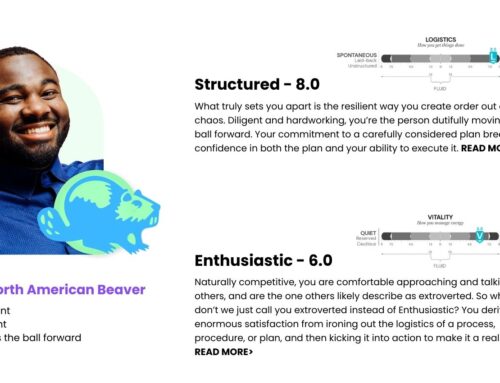What Millennials Think About Personality Tests
Contrary to what the click-hungry, hysteria-generating media would have you believe, most humans are not intolerant, warmongering, sex-crazed, drug addicts.
What they are, at times, is overwhelmed and lost. Which is one of the reasons personality tests are so popular: people are eager to understand themselves and the world around them.
Too bad most of those tests are completely useless.
Your mom, and your mom’s mom probably took the Myers-Briggs. Sad but true because there’s absolutely zero science behind it. Fun? Sure. But useful? Nope.
The good news is there are some highly useful personality assessments available (yes, we’ve built one of them and it’s called the ALIVE Big 5), but to understand the difference requires you to understand the reasons most personality tests, in the words of Millennials: suck.
#1. Science
Millennials believe in facts and science. There’s a reason kids aren’t taught the earth is flat and you no longer can buy snake oil for baldness and rheumatism: science.
Yet the Myers-Briggs personality assessment, which was cooked up a century ago as a parenting tool by a mother-daughter team with absolutely no credentials in the behavioral or psychological sciences, is still taken by nearly 3 million people each year.
Problems with Myers-Briggs:
- An either-or approach to typecasting people (e.g. you’re either an introvert or extrovert), which simply does not exist in humans
- Results that routinely change each time someone takes the test
- Completely overlooking one of humankind’s most potent traits, emotional stability (aka neuroticism)
Little wonder scientists hold the test in contempt.
So while you may enjoy reading Myers-Briggs’ sunny, horoscope-style results, they’re worthless if you actually want to learn something useful about yourself.
#2. Shades of Gray
Millennials are sick of ‘black and white’ ways of viewing the world. Pop psychology’s personality assessments like Myers-Briggs love binary (either-or) systems that dump you into one bucket or another (e.g. extrovert vs introvert, feeling vs thinking, etc.). Which would be terrific if this approach in anyway resembled reality. Alas, we humans are exceedingly complex creatures with highly-nuanced, multifaceted personalities comprised of varying degrees of behavioral traits and sub-traits (and lots of other goodies as well).
#3. So What?
Millennials want to make a difference. They want change. Imagine if the doctor viewed your MRI and said, “I see a tumor, probably cancer.” Then clapped you on the back and said, “Hey, good luck in the future” as he showed you the door. Not terribly useful. Yet this is the commonplace approach to most personality assessments. People want more than a 4-letter acronym or cute label – they want to understand what their unique personality means, how others might interpret it, and most important, what they can do with that information to reach their goals in life and overcome challenges.
#4. Can You Hear the Echo?
Millennials want meaning. Far too many personality assessment reports merely echo back what you tell it. Example: On the assessment you admit to enjoying large parties. The report tells you: You love large parties. Gee, thanks. Personality assessment reports need to make use of the data along with the behavioral and psychological expertise behind them to deliver informed opinions, predictions, and guidance into what the test-taker can expect. Otherwise, you’re simply shouting into a canyon.
#5. Who’s This For?
Millennials want custom-built, on-demand tools build for ‘me.’ Even if you’re taking a scientifically valid personality assessment, it’s almost certainly designed as a tool for practitioners (e.g. coaches, HR professionals, therapists, college counselors, etc.) to understand their clients. Missing from that equation is, you know, the person who actually took the test. The result: the test-taker remains beholden to the practitioner for help and guidance.
#6. Whose Personality Is It, Anyway?
Millennials have been comfortable sharing their data, but they do want access to it, and the choice to share it! While the Internet has its issues, it has managed to give consumers more and more ownership of their own lives. Except in the personality assessment world, where the results of your tests, their reports, and the data itself remain stubbornly out of reach (or more specifically, in the hands of the test owners and practitioners). They may as well lock you into a bottle and call you Genie.
#7. You Got the Time?
Millennials are impatient with slow, old, friction-filled systems replete with inefficiencies. Most personality tests take a looooong time to complete. Some of the valid heavyweights can take an hour. Or more. Even the invalid ones like Myers-Briggs can chew up 30 minutes of your day. Yet a valid test asking the right questions should be able to nail the majority of your personality in roughly 5 minutes. But hey, if you’re bored….
#8. You Get What You Pay For (Except When You Don’t)
Millennials want free, and top quality free. Zoom is amazing, and free. Instagram is beautiful, and free. While advertiser-driven pop personality tests are often quite fun, and free, it’s because they don’t actually mean anything. They’re entertainment to drive ad revenue. So, feel free to waste your time on them, but by all means not your hard-earned money. On the other end of the spectrum are the scientifically valid tests that cost a lot of money and are administered by practitioners (who themselves paid lots of money to become licensed in the fine art of administering high-priced tests). The problem here is the practitioner – or the company or university that paid him/her – keeps your test, its data, and the reports.
#9. What Did You Call Me?
Millennials like memes. Pop psychology quizzes are designed to be memorable. Who doesn’t enjoy a Star Wars-themed quiz that reveals you’re most like Chewbacca? It’s good, harmless fun and utterly useless. And the Myers-Briggs likes to call people names, using ‘four letter words,’ so to speak. The scientifically valid tests, on the other hand, are far more meaningful. But because they’re so drowning in inaccessible jargon and complexity it’s a fair question to ask who they’re actually meaningful to? It’s at least cool to be associated with Chewbacca.
#10. Want a Quickie?
Millennials want a meaningful relationship. We’re not suggesting that most personality test providers are only casually interested in your mind – we’re telling you they are. How else to explain an approach that has you take a test, read a report, and, well, that’s it? Yup. That’s it. Human personality and the behaviors influenced by it are big, dynamic stuff. So if you’re looking for an ongoing assist that scales as you grow, offers customized tools for your success, and accelerates your growth over time, find a partner that is built for those needs (that’s us – InsightFull).
On that note: want to know the #1 reason InsightFull is loved by Millennials (and everyone who’s moving into the modern digital world)? Because we don’t do the 10 things you just read!
Visit us at lucidata.io to learn more. Or, if you’ve got some personality assessments peeves of your own, shoot them our way at hello@insightfull.co. We love making fun of the competition.
What Millennials Think About Personality Tests
Contrary to what the click-hungry, hysteria-generating media would have you believe, most humans are not intolerant, warmongering, sex-crazed, drug addicts.
What they are, at times, is overwhelmed and lost. Which is one of the reasons personality tests are so popular: people are eager to understand themselves and the world around them.
Too bad most of those tests are completely useless.
Your mom, and your mom’s mom probably took the Myers-Briggs. Sad but true because there’s absolutely zero science behind it. Fun? Sure. But useful? Nope.
The good news is there are some highly useful personality assessments available (yes, we’ve built one of them and it’s called the ALIVE Big 5), but to understand the difference requires you to understand the reasons most personality tests, in the words of Millennials: suck.
#1. Science
Millennials believe in facts and science. There’s a reason kids aren’t taught the earth is flat and you no longer can buy snake oil for baldness and rheumatism: science.
Yet the Myers-Briggs personality assessment, which was cooked up a century ago as a parenting tool by a mother-daughter team with absolutely no credentials in the behavioral or psychological sciences, is still taken by nearly 3 million people each year.
Problems with Myers-Briggs:
- An either-or approach to typecasting people (e.g. you’re either an introvert or extrovert), which simply does not exist in humans
- Results that routinely change each time someone takes the test
- Completely overlooking one of humankind’s most potent traits, emotional stability (aka neuroticism)
Little wonder scientists hold the test in contempt.
So while you may enjoy reading Myers-Briggs’ sunny, horoscope-style results, they’re worthless if you actually want to learn something useful about yourself.
#2. Shades of Gray
Millennials are sick of ‘black and white’ ways of viewing the world. Pop psychology’s personality assessments like Myers-Briggs love binary (either-or) systems that dump you into one bucket or another (e.g. extrovert vs introvert, feeling vs thinking, etc.). Which would be terrific if this approach in anyway resembled reality. Alas, we humans are exceedingly complex creatures with highly-nuanced, multifaceted personalities comprised of varying degrees of behavioral traits and sub-traits (and lots of other goodies as well).
#3. So What?
Millennials want to make a difference. They want change. Imagine if the doctor viewed your MRI and said, “I see a tumor, probably cancer.” Then clapped you on the back and said, “Hey, good luck in the future” as he showed you the door. Not terribly useful. Yet this is the commonplace approach to most personality assessments. People want more than a 4-letter acronym or cute label – they want to understand what their unique personality means, how others might interpret it, and most important, what they can do with that information to reach their goals in life and overcome challenges.
#4. Can You Hear the Echo?
Millennials want meaning. Far too many personality assessment reports merely echo back what you tell it. Example: On the assessment you admit to enjoying large parties. The report tells you: You love large parties. Gee, thanks. Personality assessment reports need to make use of the data along with the behavioral and psychological expertise behind them to deliver informed opinions, predictions, and guidance into what the test-taker can expect. Otherwise, you’re simply shouting into a canyon.
#5. Who’s This For?
Millennials want custom-built, on-demand tools build for ‘me.’ Even if you’re taking a scientifically valid personality assessment, it’s almost certainly designed as a tool for practitioners (e.g. coaches, HR professionals, therapists, college counselors, etc.) to understand their clients. Missing from that equation is, you know, the person who actually took the test. The result: the test-taker remains beholden to the practitioner for help and guidance.
#6. Whose Personality Is It, Anyway?
Millennials have been comfortable sharing their data, but they do want access to it, and the choice to share it! While the Internet has its issues, it has managed to give consumers more and more ownership of their own lives. Except in the personality assessment world, where the results of your tests, their reports, and the data itself remain stubbornly out of reach (or more specifically, in the hands of the test owners and practitioners). They may as well lock you into a bottle and call you Genie.
#7. You Got the Time?
Millennials are impatient with slow, old, friction-filled systems replete with inefficiencies. Most personality tests take a looooong time to complete. Some of the valid heavyweights can take an hour. Or more. Even the invalid ones like Myers-Briggs can chew up 30 minutes of your day. Yet a valid test asking the right questions should be able to nail the majority of your personality in roughly 5 minutes. But hey, if you’re bored….
#8. You Get What You Pay For (Except When You Don’t)
Millennials want free, and top quality free. Zoom is amazing, and free. Instagram is beautiful, and free. While advertiser-driven pop personality tests are often quite fun, and free, it’s because they don’t actually mean anything. They’re entertainment to drive ad revenue. So, feel free to waste your time on them, but by all means not your hard-earned money. On the other end of the spectrum are the scientifically valid tests that cost a lot of money and are administered by practitioners (who themselves paid lots of money to become licensed in the fine art of administering high-priced tests). The problem here is the practitioner – or the company or university that paid him/her – keeps your test, its data, and the reports.
#9. What Did You Call Me?
Millennials like memes. Pop psychology quizzes are designed to be memorable. Who doesn’t enjoy a Star Wars-themed quiz that reveals you’re most like Chewbacca? It’s good, harmless fun and utterly useless. And the Myers-Briggs likes to call people names, using ‘four letter words,’ so to speak. The scientifically valid tests, on the other hand, are far more meaningful. But because they’re so drowning in inaccessible jargon and complexity it’s a fair question to ask who they’re actually meaningful to? It’s at least cool to be associated with Chewbacca.
#10. Want a Quickie?
Millennials want a meaningful relationship. We’re not suggesting that most personality test providers are only casually interested in your mind – we’re telling you they are. How else to explain an approach that has you take a test, read a report, and, well, that’s it? Yup. That’s it. Human personality and the behaviors influenced by it are big, dynamic stuff. So if you’re looking for an ongoing assist that scales as you grow, offers customized tools for your success, and accelerates your growth over time, find a partner that is built for those needs (that’s us – InsightFull).
On that note: want to know the #1 reason InsightFull is loved by Millennials (and everyone who’s moving into the modern digital world)? Because we don’t do the 10 things you just read!
Visit us at lucidata.io to learn more. Or, if you’ve got some personality assessments peeves of your own, shoot them our way at hello@insightfull.co. We love making fun of the competition.



